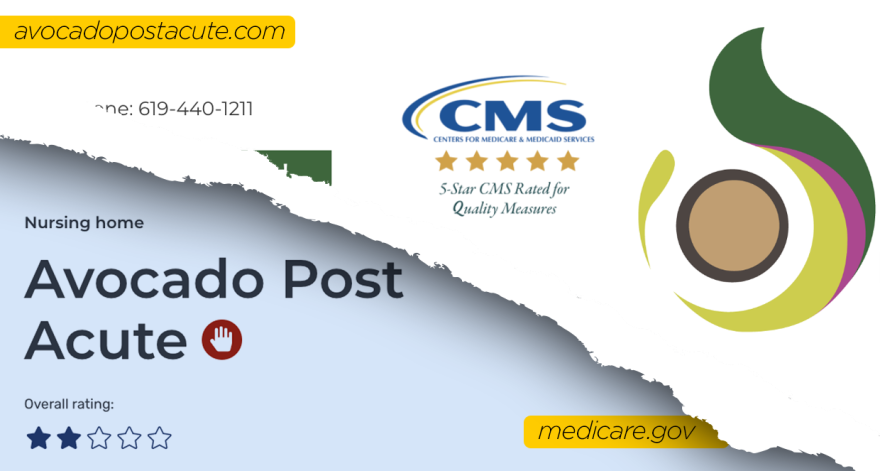Editor's Note: This story contains graphic descriptions that some readers may find disturbing.
This is part one in a two-part series.
In the early morning hours of Feb. 7, a quadriplegic woman lay asleep on a chair in her room at the Avocado Post Acute nursing home in El Cajon.
Around 2 a.m. a male resident entered the room.
He came over to the chair and slipped his hand under the sheet covering her, according to a deficiency report filed against Avocado by the California Department of Public Health (CDPH).
This incident is one of three sexual assault complaints substantiated by the CDPH at the 256 bed facility so far this year.
The sexual assault allegations are among 628 overall complaints filed against the facility since 2019, which is four times the state average among nursing homes with 100 or more beds. Along similar lines, the 124 deficiencies identified at Avocado by the CDPH since 2019 are twice the state average.
“It is an unsafe place for residents to be,” said Tony Chicotel of the Berkeley-based California Advocates for Nursing Home Reform, referring to CDPH’s findings. “It’s a dangerous nursing home and one that I would be reluctant to send anybody, let alone friends or family.”
The CDPH conclusions are buttressed by multiple lawsuits, police investigations and autopsy reports. Among the most egregious examples cited by CDPH investigators include:
- In August 2021, a 90-year-old man was strangled to death, allegedly by his roommate who, according to a lawsuit, has a “severe psychiatric illness.” He also allegedly had a history of violence against fellow patients at the facility.
- In June 2019, a 71-year-old woman was sexually assaulted by a caregiver during a diaper change. Avocado officials waited eight days before reporting the assault to police.
- In November 2021, a resident with strict swallowing precautions choked to death after she was left to eat her lunch alone. Another patient died in 2020 after choking on her donuts.
- In June 2021, a certified nursing assistant reportedly slammed a resident into a wall after the resident had a bout of diarrhea.
- In April 2022, a resident with documented substance abuse problems, allegedly shot himself up with heroin at the facility.
“It is quite straightforward,” said Scott Fikes, an attorney who has filed multiple lawsuits against Avocado, referring to the findings of investigators. “There's a long evidentiary record that shows they are unable or unwilling, whatever it may be, to provide the level and quality of care that Medicare and Medicaid demands in any other industry."
A sudden reversal
Despite Avocado’s record, the for-profit home touts itself as a “five-star” facility on its website. However, the Centers for Medicare & Medicaid Services (CMS), the federal agency that oversees the nation’s 15,000 nursing homes, gave Avocado only two stars in its most recent rating.
Since 2019, CDPH has fined Avocado at least $31,000 for the choking death of a patient, failing to report sexual abuse to police immediately and not keeping the facility free of accidents. CMS, meanwhile, has imposed $156,012 in penalties on Avocado since March of 2020 for failing to protect a resident from potential abuse, infection control issues and quality of care, abuse and reporting violations.
Avocado representatives did not return calls and emails seeking comment.

In early April, it appeared that CMS would decertify Avocado. The agency announced that it was terminating Avocado’s contract with the Department of Health and Human Services (HHS) because it had failed to protect its residents from “abuse, neglect and exploitation” and fell short on delivering quality care.
Just weeks later, however, CMS reversed course and rescinded plans to close Avocado.
A CMS spokesperson did not respond to a KPBS request for an interview, but said in an emailed statement that the termination order was pulled because Avocado had shown progress.
“On April 21, 2022, CDPH surveyors conducted a revisit survey and determined that the facility had returned to substantial compliance with the Medicare requirements,” the CMS statement said. “As this occurred prior to the termination date, Avocado Post Acute was not terminated from the Medicare program.”
But the public record reveals continued serious problems at Avocado.
State documents show two months after the April termination date, CDPH investigators found 13 federal deficiencies at Avocado during a June visit to the nursing home. The violations ranged from failing to obtain dialysis for two residents who needed it to not repositioning a quadriplegic resident with bed sores every two hours as required.
Investigators also found 26 residents infected with the multi-drug resistant bacterial infection called Carbapenem-resistant Acinetobacter baumannii (CRAB). And they found cockroaches under a kitchen sink.
CMS told KPBS in another emailed statement that those “health deficiencies” found in June did not constitute “actual harm” or “immediate jeopardy.” CMS added that a written plan of action submitted by Avocado in July brought the facility back into “substantial compliance.”
Also, as of Sept. 6, state investigators have substantiated 11 incidents of abuse of residents and one quality-of-care violation at Avocado since the cancellation of the decertification order.
Chicotel said the ongoing deficiencies and violations at Avocado reflect poorly on federal regulators.
“To me, this June survey indicates that CMS was not looking very hard when it concluded that Avocado was in substantial compliance because just a few months later, they still have problems,” Chicotel said. “So was CMS really serious about that decertification? I am thinking probably not.”
Although rare, CMS has cut funding from troubled nursing homes. It is in the process of decertifying the Laguna Honda Hospital nursing home in San Francisco. In February, the agency decertified Kingston Healthcare Center in Bakersfield for poor care. That facility has since been shuttered.
Fikes said the recent deficiencies found at Avocado also show that the decertification notice did little to motivate Avocado’s operators to change their ways.
“They’re incapable of operating their facility to federal and state standards, incapable of accepting responsibility for their failures, incapable of addressing and acknowledging problems and attempting to correct them, (and) unwilling to do the right thing.” Fikes said.
A broken system
Chicotel said CMS’s backtrack on terminating Avocado’s contract is an example of a broken system that shields nursing homes instead of protecting their residents.
“They’re playing a game,” Chicotel said. “CMS and CDPH are not a consumer protection agency. They are a provider protection agency. They are looking out for providers. And they are keeping the provider in business.”
“They’re playing a game. CMS and CDPH are not a consumer protection agency. They are a provider protection agency. They are looking out for providers. And they are keeping the provider in business.”Tony Chicotel, California Advocates for Nursing Home Reform
Chicotel contends regulators are afraid to shut down inferior long term care facilities because they believe there is already a shortage of nursing home beds.
“Regulators have been conditioned to tolerate violations, even in some cases, really bad, horrible, death-causing violations because there is just not, in their opinion, a lot of providers out there willing to do this,” Chicotel said.
The end result, he said, is the nursing home regulatory system is rendered all but impotent.
“We have the rules and they look great on paper and they give people confidence that the care might be good, and then we don't enforce them so they, over time, just become meaningless,” he said.
Avocado is on a candidate list to be a special focus facility, according to CMS records. The agency deems nursing homes on the list as subpar based on inspections and staffing. The government gives special focus facilities extra training and other resources to improve care.
Fikes said the federal government’s willingness to give help to Avocado instead of taking away its license to operate is yet more proof that for-profit nursing homes are not market-based.
“In any other market, the participant who did the worst would be gone,” Fikes said. “Here the participant that does the worst gets even more resources despite their long history and track record of doing very poorly.”
Strong profits
Through it all, Avocado has enjoyed robust profit growth. The company’s annual profits grew 72%, from $3.2 million in 2017 to $5.5 million in 2020, according to the facility’s financial disclosures. Records for 2021 are not yet publicly available.
”That is a fantastic revenue stream,” said Ernie Tosh, an expert on senior care facilities’ finances. “They’re crazy profitable.”
Given Avocado’s compliance record, Tosh said short of a closure, regulators could deploy a third party monitor to ensure the nursing home provides quality care.
“And you should also be fining them substantially,” Tosh said. ”So that you get their attention.”
-
As temperatures linger in San Diego around 90 degrees or higher for another day, being homeless is even more dangerous.
-
Details on why an El Cajon nursing home remains open after a long record of poor care and abuse. In other news, a local doctor’s monkeypox advice is going viral. Plus, how schools without AC units are dealing with the heat wave.











